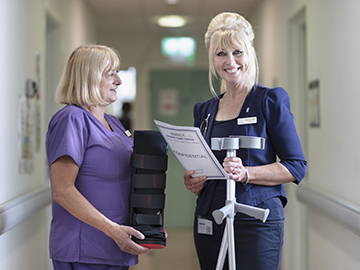Compassion calls us to recognise and empathise with people’s individual suffering and needs.
“The kind word, the gentle compassionate look and the patient hearing
of sorrows – these cost the giver nothing.” (Catherine McAuley)
BEING COMPASSIONATE
Compassion calls us to recognise and empathise with people’s individual
suffering and needs.It is expressed by:
- Fostering an attitude of openness and sensitivity to the suffering of others and responding to them with tenderness and care.
- Empathising with, listening to and trying to understand the individual’s personal situation.
- Standing in solidarity with those most in need, particularly those who are poor or marginalised and those who’s voices are not always heard.
- Being conscious of the impact our non-verbal communication can have on others.
- Creating an environment for the patients and their families that is caring and conducive to a transforming, healing process, especially with reference to crisis moments and end of life.
- Promoting a strong pastoral service which is authentic, sensitive and respectful.
Excellence derives from giving of our very best within the resources available to us.
“Take short, careful steps, not great strides.” (Catherine McAuley)
WORKING FOR EXCELLENCE
This means that at all times we give of our very best within the resources available
to us.
Excellence is sought by:
- Trying always to exceed and not just meet, the expectations of the patients who are the organisation’s principal stakeholders.
- Maintaining high standards of quality, excellence and performance in all aspects of the organisation’s services which include patient care, education, training and research in accordance with the organisation’s designation as an academic teaching healthcare institution.
- Working with staff to ensure continuous quality improvement.
- Evaluating safety improvements throughout the institution.
- Implementing where necessary, improvement plans that are based on best practice, innovative technology, knowledge and skill.
- Seeking to be reflective in practice as a means of identifying creative responses to the needs of those we serve.
- Viewing challenges as opportunities for resourcefulness and creativity.
- Affirming achievements and good practice.
- Promoting research into possible solutions to illnesses for which there is no current remedy.
Justice which is honouring the rights and responsibilities of each person in light of the common good.
“The poor need help today, not next week.” (Catherine McAuley)
UPHOLDING JUSTICE
Justice is upheld by:
- Acting with integrity, honesty and truthfulness at all times.
- Managing resources fairly and prudently with particular attention to those in most need.
- Advocating for a more equitable and accessible health service based on the principle of each person’s universal right to healthcare.
- Evaluating choices with sensitivity and compassion when they demand a more complex external environment complete with our Vision, Mission and Core Values.
- Promoting social inclusion though ensuring that services are accessible to all without discrimination and enabling those with disabilities to function as fully as their condition permits regardless of their starting point.
- Creating an environment where forgiveness and reconciliation are possible.
- Being accountable for the highest standard of performance.
Respect which we collectively understand as honouring the dignity of others by treating them as respectfully as we would like to be treated ourselves.
“Our mutual respect is to be cordial.” (Catherine McAuley)
HAVING RESPECT FOR HUMAN DIGNITY
Recognition of the dignity of each person is central to the Mercy ethos.
Respect for human dignity is demonstrated by:
- Respecting the innate dignity of each person regardless of creed, race, or orientation.
- Listening empathically and communicating appropriately while striving to be open and honest in all things at all times throughout the services.
- Being conscious that body language is as important as the words used.
- Acknowledging each patient’s right to be involved in making informed decisions about his/her health, to give consent to the extent that this is possible, to privacy and confidentiality.
- Providing a caring and welcoming ambience that gives concrete expression to respect for others and contributes to the wellbeing of all
- Fostering a culture which responds to the physical, emotional and spiritual needs of others and ensuring that it is characterised by hospitality, trust and a sense of belonging for all.
- Welcoming diversity and showing respect in all relationships and decisions.
- Assuming ecological responsibility through practices which promote respect and care for the environment.
- Demonstrating a passion for serving others.
Team Spirit means co-operating and working together to achieve our common purpose.
“The spirit of Union is the greatest blessing on a community.” (Catherine McAuley)
DEVELOPING PARTNERSHIP/TEAM SPIRIT IN ALL ENDEAVOURS
This means working in partnership to foster a team spirit in the interests of our common purpose and enhanced job satisfaction for staff
Team Spirit is created by:
- Adopting a partnership approach.
- Investing in team building to generate passion and commitment around the organisation’s core purpose.
- Creating a supportive environment.
- Recognising and acknowledging each other’s strengths and weaknesses.
- Keeping a strong focus on the organisation’s Core Purpose and Core Values.
- Having clear, regular and purposeful communication.
- Respecting and valuing the opinions of each person.
- Working to achieve consensus.
- Not allowing prejudice to cloud our judgement in the delivery of care.



